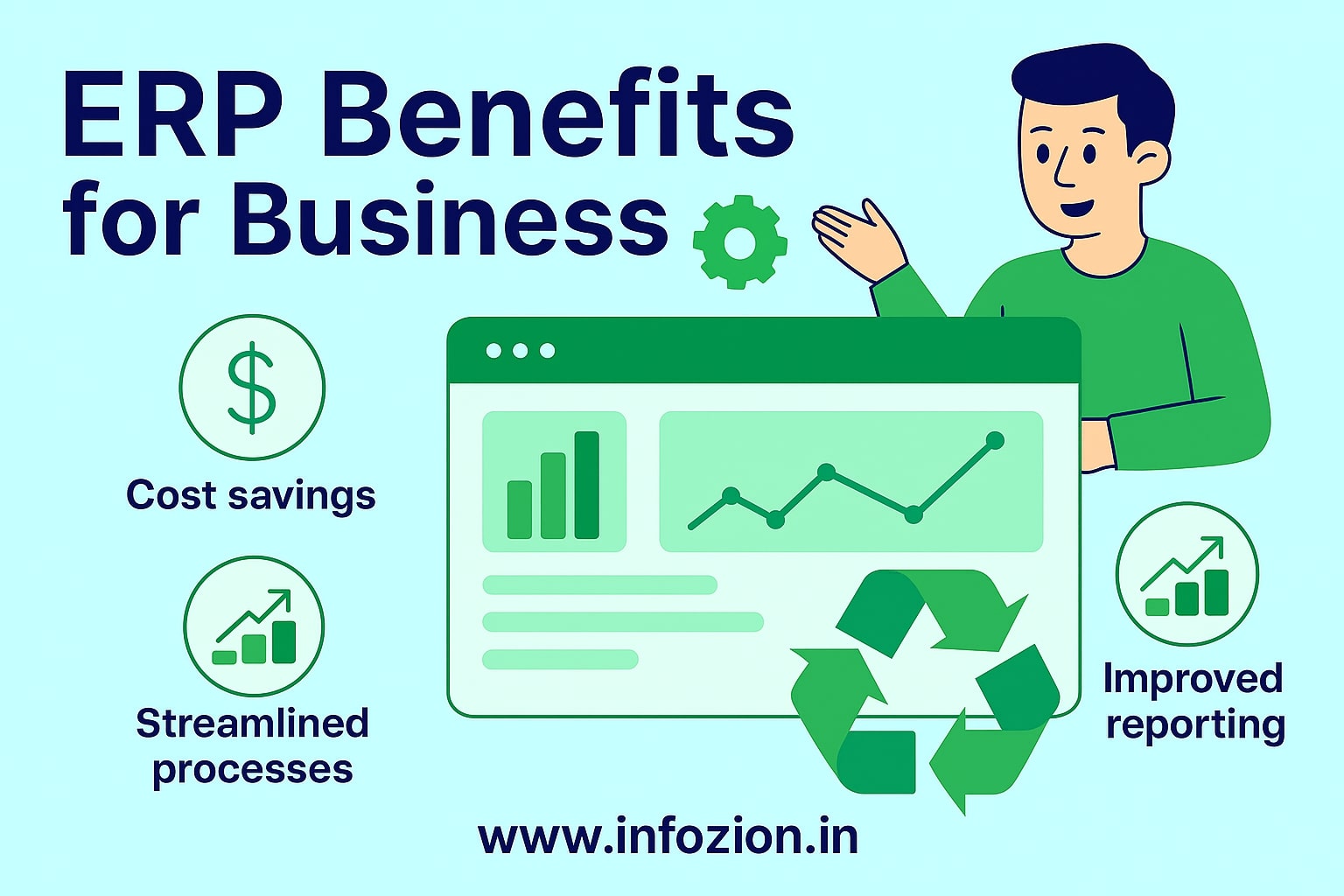ERP Benefits for Business: How ERP Software Helps Companies Work Smarter

ERP Benefits for Business: How ERP Software Helps Companies Work Smarter
Running a business can be exciting—but it’s not always easy. You have to manage sales, track money, check stock, and handle people. Doing all that with different tools can be confusing. That’s where ERP software comes in. ERP stands for Enterprise Resource Planning, and it brings everything together in one place—just like a big digital brain for your company. In this article, we’ll explore the top ERP benefits for business, how it helps teams save time, and why every growing company needs it.
What Is ERP Software?
Imagine you run a bakery. You have to track ingredients, manage employees, handle payments, and update delivery orders.
Now imagine doing all that from one dashboard. That’s what ERP software does.
ERP connects different parts of a company—like sales, finance, HR, and inventory—into one single system. When something changes in one department, everyone else can see it right away.
For example, if sales go up, the stock updates automatically, and your finance team knows what to record.
Why ERP Is Important for Business
ERP software helps both big and small businesses stay organized, efficient, and competitive.
Here’s why it matters:
Managing data becomes easier with ERP software.
Also, the system connects all departments in real time.
In addition, it reduces manual work and human error.
As a result, teams improve accuracy and save more time.
By using one connected system, ERP helps everyone stay on the same page.
If you want to learn about how companies move from setup to success with ERP, check out this detailed guide on ERP implementation phases
Top 10 ERP Benefits for Business
1. Everything in One Place
ERP keeps all your data—sales, customers, suppliers, and inventory—in one spot. Instead of switching between apps or files, you can see everything on one dashboard. This saves time and avoids confusion.
2. Better Decision-Making
Good decisions come from good data. ERP gives live reports, analytics, and charts that show what’s happening across your business. You can quickly see where you’re doing well and where you need to improve. When you have clear insights, you can make smart choices faster.
3. Improved Teamwork
ERP connects departments like finance, HR, and operations. Everyone can see the same data—no more waiting for emails or spreadsheets. It improves communication and ensures everyone works toward the same goal. It’s teamwork made simple.
4. Time and Cost Savings
ERP automates repetitive tasks like billing, reporting, and data entry. This saves time and reduces mistakes. When your team spends less time fixing errors, they can focus on things that matter—like customers and growth.
5. Real-Time Tracking
With ERP, you can see what’s happening in your business at any moment. You can track sales, inventory, and employee performance in real time. For example, if an item runs out of stock, the system alerts you immediately.
6. Better Customer Service
ERP helps you manage orders, returns, and customer details smoothly. When a client asks about an order, your team can give instant updates. This builds trust and makes your business look more professional.
7. Stronger Data Security
Data is one of your company’s most valuable assets. ERP systems protect it using advanced security measures. Only authorized people can access specific information, keeping sensitive data safe from leaks or misuse.
8. Smarter Planning and Forecasting
ERP systems don’t just show today’s numbers—they help plan for tomorrow. By analyzing past data, ERP predicts future trends like demand, sales, and stock needs. This allows businesses to prepare early and make better long-term decisions.
9. Flexibility and Scalability
ERP grows with your business. You can add new modules, features, or users anytime. Whether you’re a small startup or a large enterprise, ERP adjusts to fit your needs.
10. Accuracy and Compliance
ERP systems automatically record transactions, taxes, and reports in a structured way. This ensures your business follows government and industry rules correctly and makes audits faster and more transparent.
Advantages of ERP for Different Departments
| Department | How ERP Helps |
|---|---|
| Finance | Tracks cash flow, automates accounting, and manages reports |
| Sales | Handles leads, quotes, and invoices faster |
| HR | Manages attendance, payroll, and employee records |
| Operations | Automates production, scheduling, and logistics |
| Inventory | Reduces stock errors and avoids shortages |
Why Small Businesses Need ERP Too
Many small business owners think ERP is only for big companies. That’s not true anymore.
Modern ERP systems are cloud-based and affordable. They’re easy to use and don’t need large IT setups.
Even small shops, agencies, or startups can now enjoy the same benefits as large companies. By adopting ERP early, small businesses can grow faster, stay competitive, and make smarter decisions.
How ERP Improves Productivity
ERP helps your team work faster and better. Because tasks are automated, there’s less manual work and fewer mistakes. You can track goals, sales, and team performance easily. When employees have the right tools, they perform better—and your business runs smoother.
Future of ERP in Business
ERP systems are getting smarter every year. The next generation of ERP includes artificial intelligence (AI) to predict market trends, cloud storage for faster, safer access, and mobile dashboards for on-the-go management.
The future of ERP is about intelligence, speed, and simplicity.
If you want to explore more about how ERP systems transform business operations, you can read this detailed overview on ERP benefits and trends
Final Thoughts
ERP is not just software—it’s your business partner. It saves time, connects teams, and helps you make better decisions.
No matter if you run a small shop or a large organization, ERP simplifies your work and keeps your data secure and strong.
Moreover, companies that use ERP don’t just grow—they grow smart.
Instead of juggling spreadsheets or using too many tools, switch to a single ERP system.
As a result, your workflow becomes smoother and more efficient every day.





